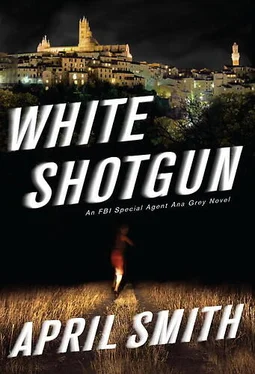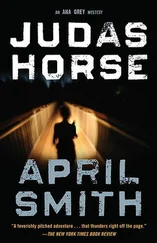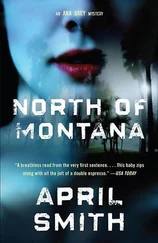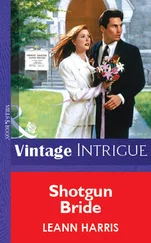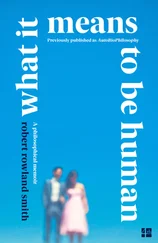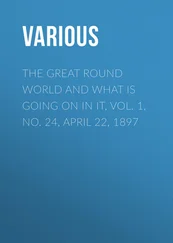April Smith - White Shotgun
Здесь есть возможность читать онлайн «April Smith - White Shotgun» весь текст электронной книги совершенно бесплатно (целиком полную версию без сокращений). В некоторых случаях можно слушать аудио, скачать через торрент в формате fb2 и присутствует краткое содержание. Год выпуска: 2011, ISBN: 2011, Жанр: Триллер, на английском языке. Описание произведения, (предисловие) а так же отзывы посетителей доступны на портале библиотеки ЛибКат.
- Название:White Shotgun
- Автор:
- Жанр:
- Год:2011
- ISBN:978-0-307-59679-6
- Рейтинг книги:4 / 5. Голосов: 1
-
Избранное:Добавить в избранное
- Отзывы:
-
Ваша оценка:
- 80
- 1
- 2
- 3
- 4
- 5
White Shotgun: краткое содержание, описание и аннотация
Предлагаем к чтению аннотацию, описание, краткое содержание или предисловие (зависит от того, что написал сам автор книги «White Shotgun»). Если вы не нашли необходимую информацию о книге — напишите в комментариях, мы постараемся отыскать её.
White Shotgun — читать онлайн бесплатно полную книгу (весь текст) целиком
Ниже представлен текст книги, разбитый по страницам. Система сохранения места последней прочитанной страницы, позволяет с удобством читать онлайн бесплатно книгу «White Shotgun», без необходимости каждый раз заново искать на чём Вы остановились. Поставьте закладку, и сможете в любой момент перейти на страницу, на которой закончили чтение.
Интервал:
Закладка:
An hour later, Sofri pulls up in the courtyard, steamy exhaust wrapping around his little black Renault. Excitement has been building in town all week — kiosks festooned with brilliant colors, drummers in medieval costumes calling men to arms, the unfathomable buzz among the Sienese. As we leave the abbey, the flare of day is just striking the hills.
My elderly guide is all decked out in an Oca-green blazer with a white shirt and a red bow tie. The white mustache and flowing hair make him look like a yachtsman for the green team, but today he is il professore. We’ve scarcely said “Buongiorno” before he launches into a monologue about the tratta, the arcane system by which each contrada receives its horse by random draw — just three days, mind you, before the big race. A veterinarian is at this moment checking out all the horses entered in the pool, because the rules say a contrada cannot give back its fated animal, even if it turns out to be lame. However, attempting to poison the steed of your enemy is an honorable tradition.
We park outside the walls of the city and hurry past Ethiopian traders opening their stalls of Chinese-made contraband handbags. There aren’t many tourists yet. It is barely 7:30 a.m. and the sun is already burning. We climb up hills, then down into the Piazza del Campo. Police are posted at the many entrances. After the empty streets, it is a shock to pass through the archways and discover a massive gathering of thousands of contrade members, as if the entire city had been herded into the plaza.
Sofri puts a hand at the small of my back, guiding us through the crowd to the doorway of one of the private palazzos that overlook the Campo. He unlocks a forbidding outer door, and then we enter a cool tiled lobby, climbing four stories to the top-floor apartment, a large open space dominated by an arch. Beyond is a fireplace with a window on either side from which you can see the square.
“Please. Be at home.”
Home it is, with warm yellow walls, mismatched wing chairs, a red-and-white-peppermint-striped sofa for rainy afternoons leafing through the books and journals on the coffee table. A brass telescope stands in silhouette against the brash white light coming through the open shutters; there are stag horns on the mantelpiece, above which a Napoleonic portrait stares out.
“Take a good look,” he calls from the kitchen.
The view is vertiginous and astonishing. The Piazza del Campo is shaped like a shell made of pink brick and gray travertine, rimmed with cafés at the foot of seven-story buildings that are joined together shoulder to shoulder. As the sun rises, their windows take on a glow like the amber eyes of the wolves that are the symbol of the city. Over the past few days, citizens have shoveled yellow earth off a truck and covered the outer ring of the Campo, transforming it into a racetrack. Sofri says it is good luck to touch la tèrra, the holy earth, which is as soft as powdered mustard.
“When you hold la tèrra in your hand, you hold the miracle of rebirth. Il Palio is about to begin. There is a saying, whenever we find ourselves fretting over something small and insignificant: ‘Don’t worry, because there will soon be la tèrra in piazza — earth in the piazza.’ The cycle of life will go on.” I find myself staring down at thousands of men surging toward a small arena where ten unsaddled horses held by grooms are pulling nervously. The crowd seems young — average age thirty — ordinary men in short-sleeved polo shirts with cowls of their contrada scarves, excited to a fever pitch. I can see TV cameras and the flat white caps of local policemen. But from an FBI point of view, the Campo is a security nightmare.
You have a ring of ancient, unreinforced structures filled with windows. An enclosed, bowl-like space with narrow exits and roofs galore, creating the potential for a catastrophic number of casualties. They predict that on the evening of the decisive race, on day four of Palio, over sixty thousand people will jam shoulder to shoulder in the center of the ring, totally transfixed by violent men riding unpredictable animals. Nobody will be looking up.
“I hope a well-trained military unit is minding the store,” I call back to Sofri. “Because this is an invitation to bad things happening.” “It is very emotional. There are always fights,” Sofri answers. “It is expected.” I join him in the kitchen for the coffee ritual. With the most sophisticated apparatusus in the world available to him — some of which he invented — Sofri prefers the classic two-cup stovetop espresso maker, which produces a crèma (the delicate layer of foam) that is almost sweet. He talks about balance of taste in the espresso liquor as if it were fine brandy. It would be an unforgivable transgression to dilute the essence with steamed milk.
“I have been working on a new coffee recipe,” Sofri says, pulling a plate from the refrigerator.
I hope it is not another species of wildlife rolled in coffee grounds. We escaped the coffee-roasted rabbit at the contrada dinner. This one I can handle: fresh dates covered with coffee cream made with egg yolks — sweet little bites to go with the espresso. Spearing seconds with a tiny fork, I ask if Sofri knows anything about a strange man who appeared outside Giovanni’s hospital room.
“What strange man?”
“He didn’t have any hands—” “ Bleah! That’s terrible.” “—just weird old-fashioned wooden prostheses. He had a bodyguard who did everything for him. Well, hopefully not everything.” “You are making this up.”
“I swear.”
“You dreamt it, maybe.”
“No, it’s real.”
“Then why are you laughing?” he asks.
“I’m not laughing,” I say, quashing the smile reflex, which signifies deception. “It isn’t funny, not to have any hands.” “Of course not,” says Sofri, fussing with the gas flame, turning it up and then down. “It’s a sad situation for anyone.” “I thought you might know him.” “Me?”
“Nicoli knows him.”
“Why?”
“I don’t know why. But we saw this man coming out of Giovanni’s room.” Sofri shrugs. “It’s a hospital. You are bound to see disturbing things,” he says, pouring thick, slightly licorice-scented liquor into two tiny cups. “The old man must have had the wrong room.” I never said the intruder was old. Now I am fairly certain that Sofri knows exactly who the Puppet is, and what he was doing at my nephew’s bedside.
A roar of exaltation goes up from the crowd, like the jubilant cry at the first strike in the first game of the World Series. We hurry from the kitchen to the windows. On the dignitary’s platform a man wearing an ascot is picking numbered balls from an urn and announcing the results over a microphone.
“That is the mayor of Siena. A horse has been assigned to Torre! Wait, let’s see …” Another cry, and Sofri slaps his knee with delight. “ Aha! Torre got a brenna.” “What is that?”
“A bad horse. Hear it? That is Oca shouting.” I see a mass of green and white contradaioli braying, “Beh! Beh!”
“What are they saying?”
“Torre got a sheep instead of a horse! Look — there’s the commissario of the police. He is a director of Torre. Cornuto! ” he shouts gleefully.
The Commissario appears to be weeping and wiping his eyes.
“Is he crying?” “I told you. Emotions.”
The powerful commissario, who would go so far as to keep blood splatter evidence out of the police report in order to deny the attack on Giovanni, is crying?
“Ti faccio un culo così!” Sofri shouts deliriously out the window, making a ghetto move, fingers pointing down like pistols, which I guess means something like, “Die, asshole!” I don’t see what’s wrong with the poor horse of Torre, to be jeered at like a nerd on the schoolyard. All the horses look beautiful, with long delicate legs and lean hindquarters; mixed breeds with thoroughbred lineage who comport themselves like aristocracy, compared with the down-to-earth, spiritually attuned wild mustangs I saw on the terrorism case in Oregon. But when Oca’s horse is assigned — a gorgeous white one — Sofri reacts as if he has been pierced with a javelin. His hand slams his forehead and he drops dramatically to his knees — like just about everybody else down there in Oca, moaning and praying in a state of suicidal despair.
Читать дальшеИнтервал:
Закладка:
Похожие книги на «White Shotgun»
Представляем Вашему вниманию похожие книги на «White Shotgun» списком для выбора. Мы отобрали схожую по названию и смыслу литературу в надежде предоставить читателям больше вариантов отыскать новые, интересные, ещё непрочитанные произведения.
Обсуждение, отзывы о книге «White Shotgun» и просто собственные мнения читателей. Оставьте ваши комментарии, напишите, что Вы думаете о произведении, его смысле или главных героях. Укажите что конкретно понравилось, а что нет, и почему Вы так считаете.
